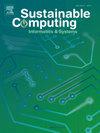自动化深度学习和物联网框架的建筑能源管理:一个大学案例研究
IF 5.7
3区 计算机科学
Q1 COMPUTER SCIENCE, HARDWARE & ARCHITECTURE
引用次数: 0
摘要
监测建筑能耗带来了巨大的机遇,尤其是在印度这样的发展中经济体。然而,当前的解决方案往往忽略了成本效益高、规模小、准确和开源的数据驱动方法。这一领域的研究经常受到安全和隐私、高投资成本和不可预测回报等问题的阻碍。为了应对这些挑战,我们开发了一种自动化的混合深度学习和物联网(DL-IoT)建筑能源管理系统(BEMS),旨在节约能源。DL-IoT将深度学习技术与模糊逻辑相结合,有效管理电性能中的不确定性和噪声。我们的DL-IoT回归模型显示出较低的平均绝对误差和均方误差,样本外能耗预测的决定系数为0.99。我们从原始数据中提取了27个用电量变量来训练模型。实验结果表明,这些特征与能源使用之间存在线性关系。所提出的模型成功地预测了有助于节能的特征,如功率因数和Y阶段的功率。具体来说,它估计在Y相和功率因数中增加一个单位的功率将导致能耗的减少。实验结果表明,该模型比其他模型更好地捕捉了数据的可变性。结果表明,该模型优于其他主流模型。通过本文的研究结果,可以建立一个更有效的能源数据管理和消费计划。本文章由计算机程序翻译,如有差异,请以英文原文为准。
Automated deep learning and Internet of Things framework for building energy management: A university case study
Monitoring energy consumption in buildings presents significant opportunities, especially in developing economies like India. However, current solutions often overlook cost-effective, small-scale, accurate, and open-source data-driven methodologies. Research in this area is often hindered by concerns related to security and privacy, high investment costs, and unpredictable returns. To address these challenges, we developed an automated hybrid deep learning and Internet of Things (DL-IoT) building energy management system (BEMS) aimed at conserving energy. The DL-IoT combines deep learning techniques with fuzzy logic to effectively manage uncertainty and noise in electrical properties. Our DL-IoT regression model demonstrated low mean absolute error and mean squared error, achieving a coefficient of determination of 0.99 for out-of-sample energy consumption predictions. We extracted twenty-seven electricity usage variables from raw data to train the model. Experimental results revealed a linear relationship between these characteristics and energy use. The proposed model successfully predicted features that could contribute to energy savings, such as Power Factor and Power in the Y Phase. Specifically, it estimated that a one-unit increase in Power in the Y Phase and Power Factor would result in a reduction in energy consumption. The findings of the experiment indicated that the model captured the variability of the data better than other models. The results demonstrated the superiority of the proposed model over other mainstream existing models. Through the results of this paper, a more efficient energy data management and consumption plan can be established.
求助全文
通过发布文献求助,成功后即可免费获取论文全文。
去求助
来源期刊

Sustainable Computing-Informatics & Systems
COMPUTER SCIENCE, HARDWARE & ARCHITECTUREC-COMPUTER SCIENCE, INFORMATION SYSTEMS
CiteScore
10.70
自引率
4.40%
发文量
142
期刊介绍:
Sustainable computing is a rapidly expanding research area spanning the fields of computer science and engineering, electrical engineering as well as other engineering disciplines. The aim of Sustainable Computing: Informatics and Systems (SUSCOM) is to publish the myriad research findings related to energy-aware and thermal-aware management of computing resource. Equally important is a spectrum of related research issues such as applications of computing that can have ecological and societal impacts. SUSCOM publishes original and timely research papers and survey articles in current areas of power, energy, temperature, and environment related research areas of current importance to readers. SUSCOM has an editorial board comprising prominent researchers from around the world and selects competitively evaluated peer-reviewed papers.
 求助内容:
求助内容: 应助结果提醒方式:
应助结果提醒方式:


